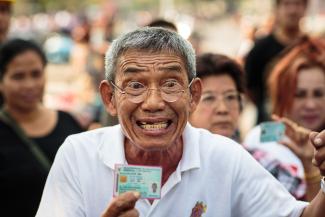Constitutional crisis
A role for civil society

The general election of 2 February has neither established a new government, nor did it resolve the political crisis. A quarter of those entitled to vote could not do so because opposition activists sabotaged the distribution of ballots, thwarted the registration of candidates and blocked access to polling stations. In many places, the election will have to be held again. Perhaps the Constitutional Court will declare the entire election void. In any case, it may take months before a new government takes office.
People are not anxious to be told the election results. The Pheu Thai party, which has been in power since 2011, is certain to win. Its only real competition, the Democratic Party, did not participate in the election. Its leaders argued that the election was illegitimate, but probably knew that they did not have a chance to win.
Both sides now consider themselves victors. Yingluck Shinawatra, the prime minister, is proud of the election having taken place at all. Her opponent SuthepThaugsuban, however, points out the “historically low” voter turnout of not quite 48 % and insists it is an expression of the people rejecting the “Shinawatra clan”.
The election did not result in any way to exit from the crisis that has been holding Thailand in its grip for months and brought the country close to a military coup. The ongoing dispute concerns core issues of governance: corruption, nepotism, the symbiosis of money and power and majoritarian tyranny. The essence of the political system is at stake, and, in the eyes of many people, its flaws mark the Pheu-Thai government.
Thaksin Shinawatra, a former prime minister who owns a fortune worth billions of dollars, is running this government from exile in Dubai. The military toppled him in 2006, and the judiciary later found him guilty of corruption. His sister Yingluck is now nominally in power in his stead. The opposition resents her populist subsidy programmes as well as her overriding goal of allowing Thaksin to come home. In the autumn, the government overplayed its hand trying to pass an amnesty law. Among other things, it would have allowed “Big Brother” to return home as an innocent man. Thaksin, the not-so-secret leader of the government, called the initiative “Restart Thailand” and spoke of national reconciliation.
Instead of reconciliation, the draft law resulted in upheaval. Hundreds of thousands, many of whom were not affiliated to a political camp before, joined the anti-amnesty campaign led by Suthep. There was reason to protest. Indeed, the campaign was necessary – and it was successful. The government gave up on its plan. But then Suthep went over the top. Seeing an opportunity to overthrow the government and chase the Shinawatras from politics, and perhaps even the country, he kept mobilising mass protests. In order to be able to agitate without restrictions, he even resigned from parliament and left the Democrat Party, the top rung of which he belonged to. He has been active in politics for four decades.
Yingluck proved stronger than he expected. She dissolved the parliament in early December expecting to get a new mandate in a new election. She is in office with the limited mandate of a transitional government.
An important aspect of the crisis is that discontent is wide-spread among Thais, but neither of the two major political camps offers any convincing solutions. Suthep represents the old elite which is just as corrupt as Thaksin. Suthep has been personally involved in various scandals. His vague and undemocratic demand is to establish a “people`s council”, designed to implement far-reaching reforms before voters return to the polls. This proposal seems excessive not only to Pheu-Thai supporters, but to many supporters of the Democrats too.
Civil society must now grasp the crisis as an opportunity. Independent organisations should use the momentum to raise the issues that are discussed in Thailand`s rice fields and social media. If they do so, change will prove possible. The nation has come of age; the people want to participate in public affairs. Democracy may be difficult, but it is the only viable option. The era of military coups is over.
Katja Dombrowski is a free lance journalist who lives in Bangkok.
kd@katja-dombrowski.info










